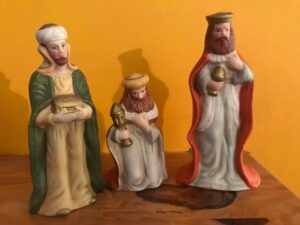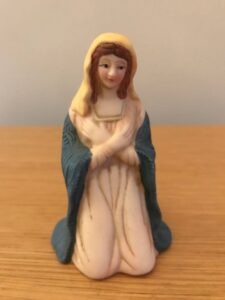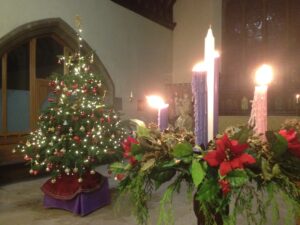
To watch this morning's service on Youtube, please click here:
The Readings
Isaiah 60.1-6
Arise, shine; for your light has come,
and the glory of the Lord has risen upon you.
For darkness shall cover the earth,
and thick darkness the peoples;
but the Lord will arise upon you,
and his glory will appear over you.
Nations shall come to your light,
and kings to the brightness of your dawn.
Lift up your eyes and look around;
they all gather together, they come to you;
your sons shall come from far away,
and your daughters shall be carried on their nurses’ arms.
Then you shall see and be radiant;
your heart shall thrill and rejoice,[a]
because the abundance of the sea shall be brought to you,
the wealth of the nations shall come to you.
A multitude of camels shall cover you,
the young camels of Midian and Ephah;
all those from Sheba shall come.
They shall bring gold and frankincense,
and shall proclaim the praise of the Lord.
Matthew 2.1-12
In the time of King Herod, after Jesus was born in Bethlehem of Judea, wise men from the East came to Jerusalem, asking, “Where is the child who has been born king of the Jews? For we observed his star at its rising, and have come to pay him homage.” When King Herod heard this, he was frightened, and all Jerusalem with him; and calling together all the chief priests and scribes of the people, he inquired of them where the Messiah was to be born. They told him, “In Bethlehem of Judea; for so it has been written by the prophet:
‘And you, Bethlehem, in the land of Judah,
are by no means least among the rulers of Judah;
for from you shall come a ruler
who is to shepherd my people Israel.’”
Then Herod secretly called for the wise men and learned from them the exact time when the star had appeared. Then he sent them to Bethlehem, saying, “Go and search diligently for the child; and when you have found him, bring me word so that I may also go and pay him homage.” When they had heard the king, they set out; and there, ahead of them, went the star that they had seen at its rising, until it stopped over the place where the child was. When they saw that the star had stopped, they were overwhelmed with joy. On entering the house, they saw the child with Mary his mother; and they knelt down and paid him homage. Then, opening their treasure chests, they offered him gifts of gold, frankincense, and myrrh. And having been warned in a dream not to return to Herod, they left for their own country by another road.
New Revised Standard Version Bible, copyright © 1989 the Division of Christian Education of the National Council of the Churches of Christ in the United States of America. Used by permission. All rights reserved.
The Sermon
St. Marks
To be uploaded later today.
The Prayers
Prepared by Veronica H
In the power of the spirit and in union with Christ, let us pray to the Father.
As we approach the beginning of another uncertain new year, we pray that we may have the confidence of the Magi to set out on our journey of hope this coming year, and come to know you more. The Magi remind us that all peoples from across the world are your children and we must welcome them as our brothers and sisters as we join with them in adoration of the Christ Child.
Lord of glory
hear our prayer.
As the Magi offered their gifts to the infant Jesus, we pray you Father to accept the offering of our hearts and minds. Help us during this coming year to grow closer to you in doing your will.
Lord of glory
hear our prayer.
All the kingdoms of this earth are yours Lord. We pray for peace between nations and for the relief of suffering, where there is hunger, oppression or disaster caused by our misuse of your earth or the tyranny of men.
Lord of glory
hear our prayer.
The Holy Family knew what it meant to flee from danger into exile to escape Herod’s attacks on the innocent baby boys. Father of all, use us to ensure that refugees among us are welcomed and cared for, and that those suffering poverty are fed.
Lord of glory
hear our prayer.
Father, your Son shared his life in an ordinary home and family in Nazareth. We pray that you will protect our friends and neighbours in this community, and give you thanks for the work of the Foodbank, the Advice Centre and the Library in supporting those in need. Be with all those who are ill in mind or body at this time of great anxiety for so many people.
Lord of glory
hear our prayer.
Father we rejoice in our fellowship with the shepherds, the angels, the magi, the Virgin Mary, St. Joseph and all the faithful departed. In your unfailing love for us and for all your people, hear and answer our prayers through your Son, our Saviour Jesus Christ.
Amen.



